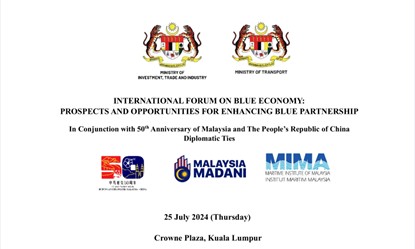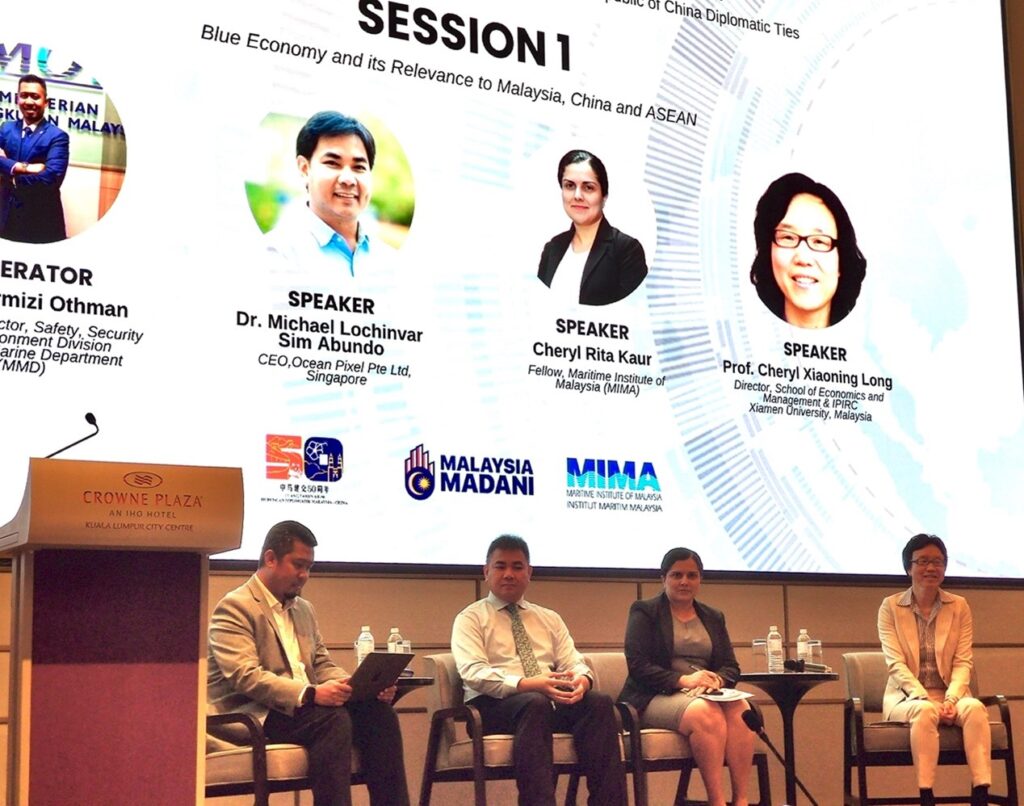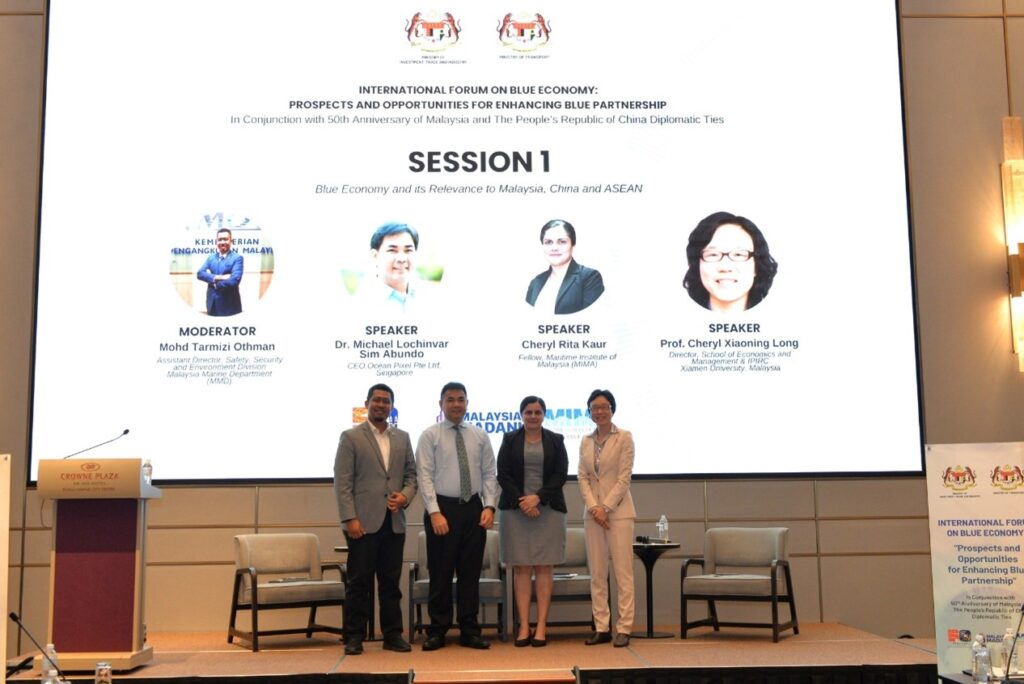On July 25, 2024, Professor Cheryl Xiaoning Long, Director of the Intellectual Property and Innovation Research Centre (IPIRC) of Xiamen University Malaysia, was invited to attend the “International Forum on Blue Economy: Prospects and Opportunities for Enhancing Blue Partnership and Celebrating the 50th Anniversary of China-Malaysia Diplomatic Ties” and delivered a keynote speech. The International Forum was organized and hosted by the Maritime Institute of Malaysia (MIMA) in collaboration with the Ministry of Investment, Trade and Industry of Malaysia (MITI), the Ministry of Transport of Malaysia (MOT), and the Embassy of the People’s Republic of China in Malaysia.
With the goal to promote cooperation in sustainable economic development, the forum brought together government officials, industry experts and academic representatives from China, Malaysia, Singapore, Indonesia and other countries. At the beginning of the forum, the Deputy Minister of Transport of Malaysia, YB Datuk Haji Hasbi bin Habibollah, the Minister Counsellor of the People’s Republic of China in Malaysia, Lin Shiguang, and the Secretary General of the National Chamber of Commerce and Industry of Malaysia, Mr. Chai Woon Chew, all gave warm welcome speeches.

The forum consisted of two plenary sessions, with the theme being “Blue Economy and its Relevance to Malaysia, China and ASEAN” and “Enhancing Blue Partnership” for the two sessions, respectively. Professor Cheryl Xiaoning Long delivered a keynote speech in the first session, entitled “Navigating the Blue Economy: China-Malaysia Maritime Partnership”. Professor Long firstly explained the importance of the oceans, which not only provide food for more than three billion people, but also help maintain climate stability, facilitate trade in Marine goods and services, and provide a large number of jobs; She then introduced the definitions of the blue economy by different institutions, and pointed out that the concept blue economy inevitably comprises of the ecological component and the economic component.

When discussing the cooperation between China and Malaysia along the dimension of blue economic growth, Professor Cheryl Xiaoning Long first related to the close relationship between China and Malaysia. China has been Malaysia’s largest trading partner for 15 consecutive years, while Malaysia is China’s second largest trading partner in ASEAN. In addition, Professor Long analyzed the current situation and prospects of cooperation between China and Malaysia in the fields of tourism, fisheries, oil and gas, and marine technology.
Regarding the cooperation between China and Malaysia in the dimension of sustainable development, Professor Long highlighted unique opportunities for cooperation between China and Malaysia in the field of blue carbon. Blue carbon refers to the processes, activities and mechanisms that absorb carbon dioxide from the atmosphere and fix and store it in oceans and marine ecosystems such as mangroves, salt marshes and seagrass. After a brief introduction of the importance of blue carbon and its various advantages, Professor Long focused on the challenges and opportunities faced by China and Malaysia in implementing cooperation in the field of blue carbon, which could be an important potential contributor to sustainable development. One difficulty is to accurately measure and verify the amount of blue carbon. While rigorous measurement methods already exist for the amount of carbon stored in forests, robust methods for measuring blue carbon are still being developed. Relatedly, the storage capacities of different blue carbon habitats may differ from those of forests and other ecosystems, making it difficult to estimate and compare the carbon storage potential between different projects. Another difficulty is to ensure that the emission cuts generated by the blue carbon project are permanent (i.e., they will not occur somewhere else in the future) and additional (i.e., they would not have occurred in the absence of the blue carbon project).
While both challenges and opportunities exist in many related fields, China and Malaysia should prioritize by conducting joint research and development projects in areas such as blue carbon capture and storage, cooperating to develop rigorous scientific methods to measure and verify blue carbon quantity, and collaborating to establish a comprehensive and transparent blue carbon storage registration system in the two countries and the neighboring region to set up institutional foundations for the establishment of regional carbon trading markets.
Finally, Professor Long explored the potentially important role that Xiamen University Malaysia could play in promoting the Blue Economy partnership between China and Malaysia. She pointed out that the China-ASEAN Marine College, the School of Energy and Chemical Engineering, the School of Economics and Management, and the Intellectual Property and Innovation Research Centre (IPIRC) of Xiamen University in Malaysia can each provide practical and concrete help to promote the development of the blue economy between China and Malaysia in areas including scientific research, personnel training and international exchange.
During the Q&A session, Professor Long, together with other speakers of the session, Dr. Michael Lochinvar Sim Abundo from Ocean Pixel Pte Ltd, Singapore, and Ms. Cheryl Rita Kaur from MIMA, answered questions from the moderator, Mr. Mr. Mohd Tarmizi Othman from Malaysia Marine Department (MMD), as well as the audience.

(source:Maritime Institute of Malaysia (Facebook))
Professor Long’s keynote speech offered valuable insights for how to build the China-Malaysia Blue Economy partnership, helped enhance the international visibility and academic influence of the IPIRC, and attracted wide attention from the participants. The heated discussions and exchange of ideas during the forum will hopefully help inject new vitality into the future development of the blue economy collaboration between China and Malaysia.